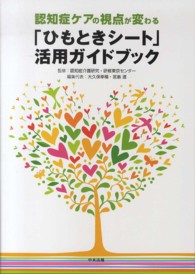- ホーム
- > 洋書
- > 英文書
- > Religion / Ethics
Full Description
Why did no other ancient society produce something like the Bible? That a tiny, out of the way community could have created a literary corpus so determinative for peoples across the globe seems improbable. For Jacob Wright, the Bible is not only a testimony of survival, but also an unparalleled achievement in human history. Forged after Babylon's devastation of Jerusalem, it makes not victory but total humiliation the foundation of a new idea of belonging. Lamenting the destruction of their homeland, scribes who composed the Bible imagined a promise-filled past while reflecting deeply on abject failure. More than just religious scripture, the Bible began as a trailblazing blueprint for a new form of political community. Its response to catastrophe offers a powerful message of hope and restoration that is unique in the Ancient Near Eastern and Greco-Roman worlds. Wright's Bible is thus a social, political, and even economic roadmap - one that enabled a small and obscure community located on the periphery of leading civilizations and empires not just to come back from the brink, but ultimately to shape the world's destiny. The Bible speaks ultimately of being a united yet diverse people, and its pages present a manual of pragmatic survival strategies for communities confronting societal collapse.
Contents
I. The Rise and Fall: 1. Abraham and Sarah: From One to the Many; 2. Miriam: Empire and Exodus; 3. Deborah: A New Dawn; 4. David: Between North and South; 5. Ahab and Jezebel: Putting Israel on the Map; 6. Jehu and Elisha: Israel's Downfall and Judah's Jubilation; 7. Hezekiah and Isaiah: Putting Judah on the Map; 8. Josiah and Huldah: Judah's Downfall and Deportation; II. Admitting Defeat: 9. Daughter Zion: Finding One's Voice; 10. The Creator: Comforting the Afflicted; 11. Haggai the Prophet: Laying the Foundation; 12. Nehemiah the Builder: Restoring Judean Pride; 13. Ezra the Educator: Becoming a People of the Book; 14. Hoshayahu the Soldier: Peoplehood as a Pedagogical Project; III. A New Narrative: 15. Jeremiah and Baruch: A Monument to Defeat; 16. Isaac and Rebekah: The Family Story; 17. Moses and Joshua: The People's History; 18. Hannah and Samuel: The Palace History; 19. Solomon and the Queen of Sheba: The National Narrative; 20. Jonah: The Prophets as Survival Literature; 21. Yhwh's People: Codes, Covenant, and Kinship; IV. A People of Protest: 22. Matriarch: Women and the Biblical Agenda; 23. The Hero: Redefining Gender Roles; 24. The Other: Tales of War, Outsiders, and Allegiance; 25. The Soldier: Sacrificial Death and Eternal Life; 26. Prophet and Priest: Open Access and Separation of Powers; 27. The Sage: Job, Proverbs, and Ecclesiastes; 28. The Poet: The Song of Songs and Psalms; 29. The Queen: Peoplehood without Piety.







